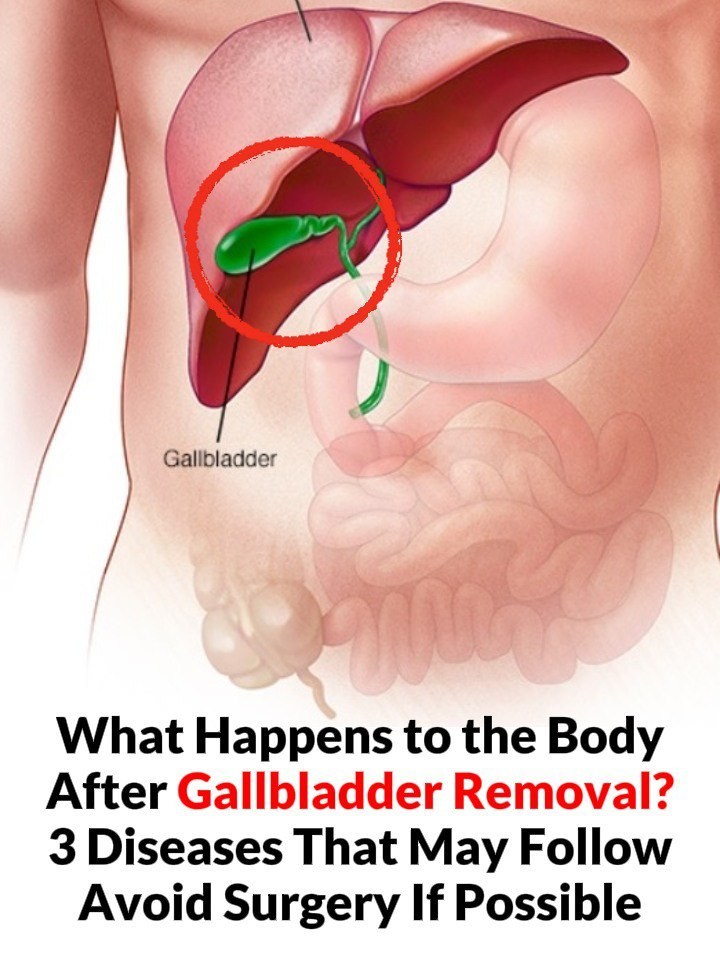-
Relief from recurring gallbladder pain or “attacks” linked to gallstones or inflammation. Verywell Health+1
-
No more gallstone‑related complications (blockages, infections, biliary colic). Wikipédia+1
-
For many, digestion returns to near‑normal after recovery and adaptation. Cleveland Clinic+1
In fact, studies show that up to 75% of people get full symptom relief within months, and as many as 96% within a year. Verywell Health
⚠️ Possible Side Effects & Long‑Term Changes
That said, removing the gallbladder isn’t always perfectly smooth. Some people experience ongoing or new digestive changes, collectively called Post‑Cholecystectomy Syndrome (PCS). INRA Biotec+2bupa.co.uk+2
Common Symptoms / Issues
-
Diarrhea or loose stools — because bile flows continuously into the intestines, fat digestion may be less regulated. Around 25% of patients may experience diarrhea post‑surgery. Verywell Health+1
-
Digestive discomfort: gas, bloating, flatulence, indigestion, occasional nausea or upset stomach — especially after fatty or heavy meals. INRA Biotec+2Vinmec International Hospital+2
-
Fat intolerance: some people may find that fatty foods no longer digest well, leading to discomfort. INRA Biotec+1
-
Persistent abdominal pain — in some cases, ongoing pain or discomfort occurs even months or years later. This may be due to bile‑duct changes, bile flow disruption, or other gastrointestinal causes. Wikipédia+2Vinmec International Hospital+2
-
Changes to nutrient absorption and metabolic balance: Since bile helps absorb fat‑soluble vitamins (A, D, E, K), some people may need to be mindful of their fat-soluble vitamin intake after surgery. Mission Surgical Clinic+1
-
Possible long‑term impacts on metabolism and gut health: Recent research suggests removing the gallbladder can alter bile‑acid patterns and affect gut microbiota — which might slightly increase risk for metabolic conditions in some individuals. ScienceDirect+1
Rare But Serious Complications
While uncommon, gallbladder removal (especially if not done carefully) can lead to:
-
Bile duct injury or bile leaks — which may cause pain, jaundice, infection, or require further surgical intervention. bupa.co.uk+2Wikipédia+2
-
Post‑operative complications such as infection, bleeding, or wound issues (especially in open surgery vs laparoscopic). bupa.co.uk+2Wikipédia+2
🧭 Tips for a Smooth Adjustment – Diet, Lifestyle & What To Watch For
If you (or someone you know) recently had gallbladder removal — or are preparing for it — these guidelines can help minimize discomfort and support long‑term health:
🍽️ Dietary & Lifestyle Tips
-
Limit high‑fat, greasy, fried foods, especially right after surgery. Fat digestion is less efficient initially. MEH+2Verywell Health+2
-
Eat smaller, more frequent meals instead of large heavy meals — this helps your liver and intestines manage bile flow more effectively. MEH+1
-
Gradually re‑introduce healthy fats (like fish oils, olive oil, nuts) and monitor how your body reacts. Many can tolerate moderate healthy fats over time. MEH+1
-
Focus on balanced nutrition, including fiber-rich whole foods, lean proteins, and fruits/vegetables — helps digestion and overall health. MEH+1
🩺 When to Consult a Doctor
-
If you have persistent diarrhea, abdominal pain, bloating or nausea that lasts beyond a few weeks — this may be signs of PCS or bile‑acid imbalance. INRA Biotec+2bupa.co.uk+2
-
If you notice yellowing of the skin or eyes (jaundice), fever, or signs of infection — could indicate bile duct complications or leaks. bupa.co.uk+1
-
If digestion problems interfere with daily life long‑term — ask about possible treatments or diet adjustments.
🎯 Bottom Line: Yes — You Can Live Normally — But Strategy Helps
Removing the gallbladder doesn’t mean you lose your ability to digest food or live healthily. For most people, symptoms improve quickly, and life returns to normal with minor adaptations. Indeed, many experience relief from prior pain and gallstone issues. Verywell Health+2Wikipédia+2
But it’s not automatic — your body does need time to adjust. Good diet choices, realistic expectations, and monitoring for lingering issues make a big difference. For a successful, symptom‑free life post‑gallbladder, healthy eating, moderation, and mindfulness tend to pay off best.
If you like — I can build a “Post‑Gallbladder Removal Guide” article: with do’s & don’ts, meal plan ideas, what to eat, what to avoid, and warning signs to watch for.
Want me to draft that for you now?

